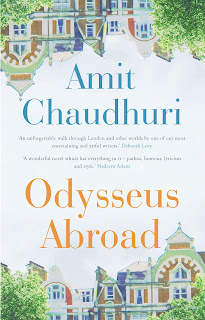Mini Odyssey
The article was published in The New Indian Express, Dec 26, 2015, in a somewhat altered form. This is the original version.
*
I read Amit Chaudhuri’s novel A New World in 2011. It was the first time that I had read a plotless novel in which the situations of the main characters remained static throughout the length of the work. Unlike some other works of fiction where such stasis engenders the neuroses propelling the main character(s), Chaudhuri’s novel skillfully muted extreme feeling or action. His sentences were exact, beautiful, and carried the impressionistic load of his content perfectly.
With time, I understood Chaudhuri as someone uninterested in the excesses of the Indian experience (in India or elsewhere). His novels showed snippets of sedate lives that took glory in persistence, despite suffering lacks that were noticeable yet never easily expressed.
So it was interesting when Chaudhuri tackled one of the speediest, most eventful stories ever, that of Odysseus, in his latest novel Odysseus Abroad. Not surprising, however, for Chaudhuri’s reviewers have, over the years, regularly mentioned Joyce as a visible influence, and wasn’t Joyce’s biggest project, Ulysses, the mundanization of Odysseus’ exile and return.
In Odysseus Abroad, Chaudhuri chooses the same project. Ananda, a BA-English student in London, wakes up in his one-room apartment, practices his singing, goes out to meet his teacher, then goes further to meet his uncle, Rangamama. The two of them go out for a walk, eat snacks, eat dinner, then return to Ananda’s flat, from where the uncle heads for his residence after some time. Both feel homesick, though home is not necessarily equal to India here. Broadly, Ananda is Telemachus, his teacher is Nestor, Rangamama is Odysseus. Chaudhuri’s novel is a suffusing of this storyline with myriad details and a slew of references that establish conversation points with Homer’s Odyssey and Joyce’s Ulysses.
However, in sharing Joyce’s intentions in mirroring the epic in the mundane, Chaudhuri leaves no doubt that he has a bigger conversation with Joyce than he does with Homer. This time, he is inviting not just a Joyce mention, but a Joyce comparison.
Joyce’s mundane was a more microscopic mundane, described through syntactical innovations that were a thing in themselves. Chaudhury writes his Ulysses like he has always written his books. His sentences are again exact, again beautiful, again carrying their impressionistic load in perfect grammar. This constancy, otherwise so desirable in Chaudhuri’s novels, is a complicated thing in Odysseus Abroad, especially if one focuses on the Joyce comparison. Chaudhuri’s descriptions carry a classic sensibility, never sprouting into new modes to surprise or energize the reader. It is as if one is reading Flaubert’s sentences handle Joyce’s intentions.
In theme, where Joyce was a modernist, Chaudhuri is a thorough modern. Chaudhuri’s nephew-uncle duo struggle with (or, whimper about, depending on your taste for subtleties) the migrations that modernity has forced on them. Some would call this a unique reinterpretation of the Odysseus story, and while there is truth in that, the plenitude of Indians-as-migrants novels takes the sheen off the uniqueness of the claim.
That said, the novel is a natural addition to Chaudhuri’s oeuvre and a definite success. Perhaps it is just that Odysseus Abroad is too conspicuous a title for this book, placing an unnecessary burden on it. But then, how could it otherwise be thought of as operating from the highest levels of Chaudhuri’s ambitions. And didn’t Joyce do the same.



Comments
Post a Comment